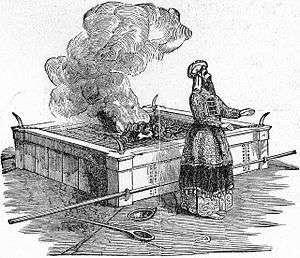Ta'anit
| Repentance in Judaism Teshuva "Return" |
|---|
|
Repentance, atonement and higher ascent in Judaism |
| In the Hebrew Bible |
 |
|
Altars · Korban Temple in Jerusalem Prophecy within the Temple |
| Aspects |
|
Confession · Atonement Love of God · Awe of God Mystical approach Ethical approach Meditation · Services Torah study Tzedakah · Mitzvot |
| In the Jewish calendar |
|
Month of Elul · Selichot Rosh Hashanah Shofar · Tashlikh Ten Days of Repentance Kapparot · Mikveh Yom Kippur Sukkot · Simchat Torah Ta'anit · Tisha B'Av Passover · The Omer Shavuot |
| In contemporary Judaism |
|
Baal Teshuva movement Jewish Renewal · Musar movement |
A ta'anit (taanis in Ashkenaz pronunciation, or taʿanith in Classical Hebrew) is a fast in Judaism in which one abstains from all food and drink, including water. A Jewish fast may have one or more purposes, including:
- A tool for repentance
- An expression of mourning
- Supplication, such as the Fast of Esther.
Jewish fast days
Full fasts
A Jewish full fast lasts from sunset to darkness the following night. There are two Jewish full fast days:
- Tisha B'Av
- Yom Kippur - the only fast day mentioned in the Torah (Leviticus 23:26-32).
The two full fast days carry four restrictions in addition to eating and drinking - one may not wash his body, wear leather shoes, use colognes, oils or perfumes, or have sexual relations. Yom Kippur also has all the restrictions of Shabbat, and Tisha B'Av has restrictions somewhat similar to a mourner sitting shiva.
The Halakha status of the two Jewish full fasts is that they are obligatory.[1]
Minor fasts
Minor fasts are observed from dawn to nightfall, without additional restrictions. There are four public minor fasts:
- Fast of Gedalia (Tzom Gedalia)
- Tenth of Tevet (Asara B'Tevet)
- Seventeenth of Tammuz (Shiva Asar B'Tammuz)
- Fast of Esther (Ta'anit Esther)
Three of the four minor fasts (all but the Fast of Esther) are mentioned in the Bible[2] as fasts in memory of the destruction of the First Temple. However, after the Second Temple was built, these fasts ceased to be observed.[3] The Talmud establishes general rules for observance of the fasts in later periods: if the Temple stands the fasts are not observed; if the Jewish people is being persecuted the fasts are observed; if neither of those is the case, then "should they desire, they fast, should they desire not to, they do not fast."[4] Nowadays, the Jewish people is accustomed to observing these fasts, making them obligatory.[3][5][6]
Four fasts
There are four Jewish fast that exist, in all or in part, in commemoration of events having to do with the destruction of the Jerusalem Temple:[1][7]
- Ninth of Av (Tisha B'Av, full fast)
- Fast of Gedalia (Tzom Gedalia, minor fast)
- Tenth of Tevet (Asara B'Tevet, minor fast)
- Seventeenth of Tammuz (Shiva Asar B'Tammuz, minor fast)
Customary fasts
Customary fasts are practiced by specific communities, or by especially pious individuals, or by certain classes of individuals.
- Fast of the Firstborn, Ta'anit Bechorot, observed on the day preceding Passover.
- Yom Kippur Katan (literally, the little Yom Kippur) - held on the day before Rosh Hodesh in most months.
- BaHaB (a Hebrew acronym for Monday, Thursday, Monday) - This is a custom to fast on the first Monday, Thursday and then the following Monday of the Jewish months of Cheshvan and Iyar—shortly following the Sukkot and Passover holidays.[8]
- Fast commemorating the Khmelnytsky massacres, held on 20 Sivan.[9]
- Fast of Samuel: Held on 28th Iyar. Not widely observed.[10]
- Fast of Moses on Seventh of Adar.[11]
- A custom exists for a bride and groom to fast on the day of their wedding. It is observed by Ashkenazi and some Sephardi Jews.[12] (This applies both to those who are marrying for the first time and to those who are remarrying.) They fast from daybreak until after the chuppah, eating their first meal during their yichud seclusion at the end of the ceremony.[13] This custom is not recorded in the Talmud,[14] and first appears in Sefer HaRokeach.[15]
Customarily, special prayers called selichot are added in the morning prayer services on many of these days.
Break the fast
A break the fast is a meal that takes places following a fast. After Yom Kippur, it is viewed as a festive meal. The tendency is to overeat after a fast, but this should be avoided. Since the digestive system slows down during fasting, heavy foods such as meat are liable to cause indigestion. Therefore, many Jews are religiously accustomed to eating dairy foods after a fast. Eating light, dairy foods in moderation is considered healthier.
See also
References
- 1 2 Bar-Hayim, David (6 July 2009). "The Four Fasts: Halakha or Minhagh". Machon Shilo. Retrieved 28 September 2017.
- ↑ Zechariah 8:19
- 1 2 https://ph.yhb.org.il/en/05-07-01/
- ↑ Rosh Hashana 18b
- ↑ https://www.etzion.org.il/en/laws-fasts-status-four-fasts-today
- ↑ The Rosh writes that this decision is made on a communal level, and individuals may not deviate. Similarly, the Ritva writes that the decision whether to fast is made by the beit din. Maimonides writes that "all of Israel are accustomed to fast" on these days (Laws of Fasts 5:5). See discussion of these positions. However, R' David Bar-Hayim reads Maimonides to mean that every Jew may personally choose to observe these fasts or not (source).
- ↑ Bar-Hayim, David (15 July 2010). "The Four Fasts and their Halakhic Status Today". Machon Shilo. Retrieved 28 September 2017.
- ↑ Hoffman, Yair. "BaHaB". The Yeshiva World. The Yeshiva World. Retrieved 28 September 2017.
- ↑ http://matzav.com/the-forgotten-fast-day-20-sivan/
- ↑ http://www.aish.com/tp/i/moha/48918497.html
- ↑ "The Seventh of Adar". Orthodox Union. Retrieved 28 September 2017.
- ↑ https://ph.yhb.org.il/11-05-09/
- ↑ https://www.ou.org/torah/halacha/dalet-amot-of-halacha/fasting-ones-wedding-day/
- ↑ Fasting on the Jewish Wedding Day. Note however that the Jerusalem Talmud (Bikurim 3:3) mentions that on a wedding day one's sins are absolved. Maharam Minz (n.109) uses this idea as a justification for fasting: ונהגו [ה]חתן ו[ה]כלה להתענות ביום הנישואין עד אחר הברכה, י"א הטעם דהוא יום סליחה דידוע שנמחלו עונותיהם וי"כ דידהו כדדרשינן על הא דכתיב (בראשית כח) ויקח את מחלת. Later sources explicitly parallel the wedding day to Yom Kippur in terms of both forgiveness and fasting.
- ↑ https://www.hidabroot.org/question/27854
External links
